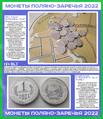Poliano-Zarečie
| 2021 | |
| Anthem: "State Anthem of PZDR" | |
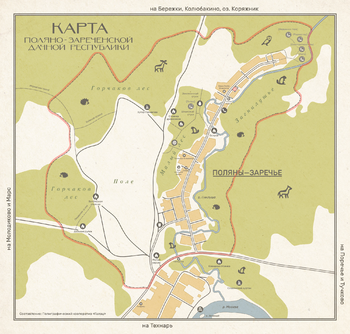 Administrative map of PZDR | |
| Capital | Poliany-Zarechie |
| Largest city | North Ignatyevo |
| Official languages | Russian |
| Ethnic groups (2021) | Russians, Ukrainians, Jewish, Armenians, other |
| Government | Beer-democratic republic (de-jure), Dictatorship of Supreme Leader (de-facto) |
• Supreme Leader | Ilya Musnitzki |
• Prime minister | Alexey Koltsov |
| Legislature | Council |
| Establishment | |
| History | |
• Adoption of Constitution | 10 May 2021 |
• Establishment of Musnicki's autocracy | 30 November 2022 |
• Established | 2021 |
| Population | |
• 2021 census | 17 |
| Currency | Dachian Pyriaz (Without the monopoly of the national bank), also Dačian Červonets (PYR) |
| Time zone | MSK |
| Date format | dd. mm. yyyy |
| Driving side | right |
| GUM 3-letter code | PZD |
| Microcode | PZ |
| Internet TLD | .pz(reserved, not used) |
Poliano-Zarechian Dacha Republic (Russian: Поляно-Зареченская Дачная Республика), also known as Poliano-Zarechie or PZDR is a micronation founded on May 10, 2021. The territory of the republic borders the Ruzsky District of the Moscow Region of the Russian Federation.
The ideology of Poliano-Zarechye is based on the concept of dachism. The country is ruled by the Supreme Leader, who is elected by the members of the Council. At the moment, the founder of Poliano-Zarechie, Ilya Musnitzki, holds this position. The main goal of the republic is to create its own democratic dacha state.
In its development, PZDR was long considered one of the most democratic micronations among the countries that emerged after the collapse of the Soviet Union. It also maintains friendly relations with other micronations, such as the “Abdem countries”, including the Ural People’s Democratic Republic, the Republic of Dambovita and Ralaenfimh (the latter no longer exists at the moment).
However, by the end of 2022, PZDR began to show signs of authoritarian tendencies. Local media reported that Ilya Musnitski was empowered with extended powers, and now he does not report to the Council. These actions provoked criticism from both citizens and other micronations, condemning such actions.
It is also worth noting that PZDR is in a state of war with the Soviet government in exile. The war was declared on January 29, 2022, due to the territorial claims of the Soviet government, although the battles have not started yet, and the war is considered cold.
The events in the country led to an interesting irony: by the decree of the Supreme Leader on December 26, 2022 (according to the Gregorian calendar), the 80s were “returned”. According to the newspaper Pivnaya Pravda(rus.Пивная Правда, eng: "Beer Truth”), 2022 was proclaimed 1986, and the upcoming 2023 will be recognized as 1987, although the duration of this “1987” remains unknown.
History

Poliano-Zarechye before unification
Poliano-Zarechie is a historically significant region, famous for its long and complex unification wars that spanned from 2009 to 2016. In those distant times, the Poliano-Zarechian region was formerly composed of two independent territorial entities - Poliania in the south and Zarechie in the north.
The history of Poliano-Zarechie is marked by a prolonged military confrontation between Poliania and Zarechie, which led to numerous clashes and instability in the region. Both sides of the conflict sought to have independent control over their territories and tried to take border areas from their opponents.
The differences between Poliania and Zarechie were significant. Zarechie, located in the north, had rich forests with advantageous trails, allowing for fast and discreet movement. This enabled them to build fortifications and colonies deep in the forest, far from the main plots. In addition, Zarechie had access to the Gnilusha river, which provided huge advantages over Poliania. The north also controlled a spring of drinking water.
On the other hand, Poliania, located in the south, had more comfortable exits to the field and had larger territories. Despite its numerical superiority, it was not united, which led to serious conflicts within its borders. Despite the political instability, the south had the main trade routes with neighboring settlements - Porechie and Tekhnary, which dictated its economic superiority over Zarechie.
According to historical archives, the period from 2009 to 2016 was marked by fierce and numerous conflicts between Poliania and Zarechie, two warring regions in Poliano-Zarechie.
The conflict began in 2009, when both regions declared their independence and claims to control over the common territories. Poliania in the south was considered a larger and more populated region, having more resources and territory. Northern Zarechie, although it had strategically important resources, was considered less developed and less powerful compared to the south.
During the conflicts, both sides tried to gain control over important resources and strategic territories. Zarechie sought to gain control over the rich forests with advantageous trails, to better manage its territory and have an advantage in military actions. The north also wanted to control the exits to the Gnilusha river, which was important for trade and water supply.
Poliania, in turn, sought to maintain its influence on the region and prevent Zarechie’s control over useful resources. The Polians also sought to have control over the main trade routes with Porechie and Tekhnar, which brought them significant benefits.
The conflicts led to numerous collisions and battles between the armed forces of both sides. The Polians and Zarechians fought for every square meter of territory. This resulted in destruction, loss of life and damage to both sides. At the same time, a Poliano-Zarechenian sport discipline was created - conethrow, which, according to the modern Association of Sport of Poliano-Zarechie, is a very barbaric, cruel and dangerous sport.
However, parallel to the armed actions, attempts to establish diplomatic relations between the two regions gradually began. Since 2011, both sides began a partnership and dialogue, aiming for a peaceful settlement of the conflict.
The first attempts of unification
In 2011, an important moment in the history of the conflict occurred. One of the imperialist groups from the south, led by brother and sister Heberlein, offered peaceful cooperation and friendship with Zarechie, which was an unexpected step towards reconciliation. This move had a positive impact on the Zarechens, who had previously met with the Polians only on the battlefield. So, the policy pursued by Heberlein, although it led to the political domination of the south, looked quite advantageous against the background of barbaric massacres with Piriaz, the future national hero of Poliano-Zarechie.
The partnership between the regions, which began in 2011, was a temporary solution aimed at bringing the sides closer together. The exchange of cultural delegations and trade relations were considered the first step towards improving mutual understanding. The residents of Zarechie appreciated the new contacts with the Polians, as before they had limited ties with the southern part of Poliano-Zarechee, where political and military confrontations prevailed. Despite the imperialist actions of Heberlein and her personal desire to control all of Poliano-Zarechye, it was her mission in Zarechie and her actions that led to the beginning of the unification of the country, albeit briefly.
However, over time, the residents of Zarechye began to notice some changes in the power structures. Gradually, the voices of the residents of the south began to have more weight in decision-making, and they exerted more and more influence on the center of public life of Poliano-Zarechie. The unofficial center of the region became the area near the telephone booth on the border of Zarechie and the spring, where important decisions were often made. Public life of Poliano-Zarecie was concentrated around the area near the telephone booth, which became the unofficial center of the region. In this regard, the residents of the northern part began to feel a loss of control over the spring of drinking water, as they rarely could be there without emissaries from the south.
After the efforts of deputies from the north, the future Supreme Leader Musnitzki and Prime Minister Koltsov, it was decided to move the capital to the spring, deep in the forest trails, away from the eyes of the public, who began to condemn the presence of a political center near the booth. Also, this was decided to ensure equal access to resources for all regions. The work on the construction of the capital began on the site of the former conethrow stadium, symbolizing the unification of the two regions.
The onset of the political crisis and the civil war of 2012-2016
However, when the construction was almost completed, it was decided to move the capital to the field, which was located in the heart of Poliania. This step already had disastrous consequences for Zarechie. On the one hand, it implied a retreat to the south, which meant the transfer of the spring under the control of Zarechie, but on the other hand, it meant the direct political dependence of Zarechie on Poliania, as the political center of the united country was located in the capital of Poliania.
The escalation of the conflict In 2012, the situation worsened to the limit. The Polians, despite the capital moved to the field, decided to build a colony on the site of an unrealized project on the territory of the shishkamet stadium near the spring, to control it and strengthen their influence on Zarechie. Many trails of Zarechie, leading from the field to the spring, also gave the southerners access to various plots of Zarechie, including Gnilusha, and came under attack. In a number of deputies from the government of Zarechie, including Musnitzki, Koltsov and Ivashchenko, there was tension and political discord, which further complicated the situation.
Political and social inequality only intensified and the situation sharply worsened. In response to the construction of the colony, allegedly common, in fact, Polian on the territory of the shishkamet stadium, where bloody matches between the two teams were previously held, the Zarezhians decided to build their own colony next to the colony of the Polians. The place of choice was a forest area on the top of the mountain near the stadium. There were many trails on the top, which allowed the Zarezhians to control the passages of the Polians to their colony, the spring and their other movements in the forest. The construction of the Zarezhian outpost in the forest, later becoming the colony of Zarechie under the name of Lithuania, was perceived by the Polians as a clear threat and caused their indignation.
The northerners named their colony “Lithuania”, and it quickly became the main shield and sword of Zarechie in all subsequent conflicts. The place chosen for construction was strategically significant, as it was at the crossroads of all key forest trails of the south-eastern Zarechie. Control over the spring became one of the key goals of both sides during the conflict.
Mutual grievances and tensions between Poliania and Zarechie led to the escalation of the conflict. In 2012, the troops of the government of Zarechie, led by Koltsov, Ivashchenko and Musnitzki, decided to destroy the colony of the southerners at the spring. This action led to a sharp reaction from Zarechie, and the troops of the government of Heberlein responded with the first looting of Lithuania.
This is how the civil war in Poliano-Zarechie began. The front of the conflict ran through the dense forests of Zarechie and the spacious fields of Poliania. The battles were fierce and bloody, and both sides suffered heavy losses. Soon after the looting of Lithuania, the conethrow stadium massacre occurred. It was the first significant clash of the armed forces of both territories. The troops of the government of Zarechie, led by Koltsov, Ivashchenko and Musnitzki, decided to launch a second attack on the colony of the Polians, located at the spring - a symbolic place of unification of the regions. Heberlein, who had the most significant weight in the Council of those years, came under fire. The battle ended with the victory of Zarechie and the end of the attempts of Poliania to secure control over the spring.
In the conditions of the ongoing conflict, Zarechie began to actively seek allies. In 2013, an alliance was formed between Zarechie and Piriaz, the leader of the southern mafia, who posed a huge problem for the government of Heberlain throughout her rule. Piriaz and his gang caused a lot of trouble for the residents of Poliania, which was very beneficial for Zarechie. Their attacks on the trade caravans of the Polianians from Tehnaria were now accompanied by trade missions of Zarechie under the protection of mercenaries. Zarechie began to try expansion on the field, but it was met with varying success. This alliance of the southern mafia and the government of Zarechie strengthened the position of the northerners, providing new resources and support in the fight against Poliania.
One of the most significant events in the course of the military actions were the battles for the field, where the capital of Poliania was located. The battles took place in 2013 and 2014. Each side sought to control this strategically important place. The Polianians, on the one hand, tried to maintain control over the capital and the access to the trade routes. Zarechie, on the other hand, craved to seize the field, to assert its political and economic independence and establish full-fledged trade with its neighbors, ending the economic blockade that the southerners had imposed.
In 2014, the region of Poliano-Zarechie became a hot spot, torn by civil war. The battles were everywhere - from the main road at the booth in Zarechie to the entrance to the cottages in Poliania. At the same time, Zarechie, led by Musnitzki, Koltsov and Ivashchenko, waged war against the only barbarians in Zarechie in the face of Slavik and Artem. The looting of Artem’s colony in 2014, which he built near the residence of Musnitzki and which greatly annoyed the latter, led to the exhaustion of the hot phase of the conflict with the barbarians and the transition to their political isolation. The power in Zarechie was finally consolidated by the triumvirate of Koltsov, Musnitzki and Ivashchenko. Having no serious opponents in Zarechie itself and achieving successes on the front with Poliania, the government of Zarechie proclaimed a new state - Lif. This step was taken after successful military achievements and looting of the capital of Poliania, which effectively meant the exit of Zarechie from the union with Poliania. The state of Lif included a significant part of the territory of Zarechie, except for the barbarian lands, and became a new strategic stronghold in the fight against Poliania.
After the proclamation of the state of Lif, the era of total mobilization began on the territory of Zarechie. This event prompted the government of Lif to actively improve its armed forces. For many years, Zarechie lived in conditions of relative peace after the previous armed conflicts with the south, and the creation of a new state seemed to be the end of the era of armed clashes.
However, the proclamation of Lif brought new challenges and threats to the region. In the new realities of Zarechie, the leadership of the country realized the need to prepare for possible armed conflicts in the future. It was decided to start a total mobilization and a massive reboot of the military apparatus of Lithuania.
The production of weapons, which was suspended in 2011, due to the lack of necessity and temporary reconciliation with the south, revived at full power. The industry of Lif, previously engaged in peaceful affairs, was reoriented to the production of military technologies and weapons. Factories and plants began to work in a round-the-clock shift mode, to meet the growing demand for combat equipment.
The armed forces of Lif actively modernized their ranks, introducing the latest technologies and updated weapons. An important step was also the training of military personnel, to ensure the effective use of the new armed forces.
Soon, the first results of the mobilization appeared on the horizon. Lif became the owner of a stronger and more ready-to-act army. This gave the country a new level of security and ensured its protection in case of resumption of armed conflicts.
The total mobilization of Lithuania after the proclamation of Lif is a vivid example of how the region prepares for the upcoming challenges and ensures its protection in conditions of unpredictability.
The Polianian capital was in a serious vulnerable position after the proclamation of Lif and the looting of Zarechie’s Polianian colony on the spring and the mobilization of Lithuania. In 2014, the troops of Zarechie, led by Ivashchenko, Koltsov and Musnitzki, made a decisive offensive step and took the capital into their hands. This moment was a turning point in the course of military actions and undermined the positions of Poliania directly in its heart. The building of the government of Poliania was completely destroyed by the troops. The boards from it were used to strengthen and update the military base in Lithuania.
Lithuania turned into a strong wooden colony, which became the main support of Poliania in the conflict. However, in 2015, the troops of Zarechie, under the command of Ivashchenko and Koltsov, again attacked the field, looting the remnants of the former greatness of the capital of Poliania. If after the capture of the field in 2014, decisive countermeasures did not follow, then in 2015, having secured the support of the barbarians from Zarechie, the Polianian troops carried out the looting of Lithuania. Lithuania, which was the main shield and sword of Lif - fell. After the looting of Lithuania, Zarechie retreated from the spring and moved its capital to the newly built Constantinople. Constantinople, located in the deep forests of the northern part of Zarechie, was created as a megacity, including three points - Constantinople, Riga and Roriksted. This city became the new center of power of Zarechie and provided much more favorable defensive positions. The passages to Constantinople along the paths from the field would be simply impossible due to the windfalls and thickets along the way, which would force the invaders to move along the main straight road. Despite the fact that Lif moved their capital to the depths of their country, their influence on Poliania did not subside. Through the agent network, which later became the KGB PZDR, the Northerners managed to overthrow the regime of Heberlain and establish a loyal government of Piriaz in Poliania. Despite the criminalization of the new government, it was very beneficial for Zarechie due to its loyalty.
A great event in the history of Poliano-Zarechie was the conclusion of a new allied treaty on the May holidays of 2016. This solemn moment of reconciliation was the culmination of the long-awaited peace between the regions, which previously faced grievances and tension.
Representatives of the south, primarily the representative of Piriaz, and representatives of the north, in the face of Musnitzki, Ivashchenko and Koltsov, gathered at an important ceremony, to consolidate their intention to stop armed clashes and gain peace and harmony. Gathering in a solemn setting, they signed a new treaty with understanding and respect for the previous events, which became a guarantee of future peace and stability in the region.
The new allied treaty became the basis for the further development of Poliano-Zarechie. It united the peoples of both regions, gave hope for peaceful coexistence and prosperity. The destroyed buildings were restored, the battlefield turned into a symbol of friendship and peace, and the southerners and northerners regained confidence in the future of their lands.
Thus, the conclusion of the new allied treaty in 2016 became a historical event for Poliano-Zarechie. It became an embodiment of wisdom, diplomacy and aspiration for peace. The new era of peace and harmony brought joy and hope, becoming a lesson for future generations that even in the most difficult situations, peace and friendship can prevail.
Post-war years
From 2017 to 2021, Poliano-Zarechie was in a deep crisis, when political stagnation and the absence of a single authority led to the onset of a period of anarcho-capitalism and lawlessness. This period was overshadowed by a gray and gloomy atmosphere, chaos and indifference to the law and public order.
With the weakening of the central authority, the political life of the region came to a standstill. The lack of a single leadership and the struggle for influence led to political delusion and inaction. Political parties and factions split, pursuing their own interests and ignoring the common needs of society.
In the conditions of a political vacuum, anarcho-capitalist ideas became an ascending trend. Power shifted into the hands of small elites, who ruthlessly exploited ordinary citizens and sought only personal gain. Growing unemployment and social inequality contributed to the rise of crime and the black market. Arms trade, smuggling and corruption became commonplace.
State structures collapsed, and lawlessness swept over Poliano-Zarechie. In the forests and fields, there was a lawless order, where the violent elements of society dictated the force and power. Violence and aggression became part of everyday life, and ordinary citizens were forced to live in constant fear.
This period of total stagnation and lawlessness lasted for several years, until Musnitzki came to power in 2021. His decisive actions and the proclamation of Poliano-Zarechie as a single state became a turning point. Musnitzki was able to unite the divided society and restore the central authority.
The proclamation of PZDR as a single state led to the end of lawlessness and wild capitalism. Musnitzki began to carry out reforms and measures to restore order and stability. The restoration of a single government and the strengthening of legality led to a reduction of crime and the restoration of public order.
Thus, the period from 2017 to 2021 was a time of darkness and chaos in Poliano-Zarechie, when wild and unregulated capitalism and lawlessness engulfed the region. The influence of small elites and the absence of central authority led to the total decay of society. However, the arrival of Musnitzki to power and his decisive actions helped to overcome this gloomy period and return hope to the region for a bright future.
Poliano-Zarechie during the rule of Musnitzki (2021 - present)
At the beginning of Musnitzki’s rule after the establishment of power in 2021, the regime in Poliano-Zarechie was truly democratic. The country actively participated in micronational organizations, such as OBSM and the Commonwealth of Micronations, and established diplomatic relations with other micronations.
The Council of PZDR, as the supreme legislative body, had enormous power, and its decisions reflected the will of the people. Important issues related to foreign and domestic policy were taken after careful discussion and voting in the Council. The Supreme Leader, appointed by the Council every five years, was subject to control and could be removed from office if necessary. The Council of PZDR in this period had significant power and made important decisions, and the people had the opportunity to influence the decisions through democratic procedures and voting. The political system was open, and citizens actively participated in the discussion and formation of the country’s policy. Freedom of speech and opinion were respected, and the media freely covered the events in the country.
Poliano-Zarechie showed active civic activity, and citizens had the opportunity to influence political decisions, expressing their opinions and suggestions through trade unions of enterprises and other social organizations.
However, over time, the situation in the country changed. Musnitzki received emergency powers, largely due to the fabricated propaganda of internal and external threats, which allowed him to concentrate unlimited power in his hands. Gradually, he began to limit political freedoms and rights of citizens, tighten control over the media and political opposition, and suppress any expression of dissatisfaction with the authority.
As he strengthened his regime, Musnitzki became more harsh and authoritarian. The power of the Council was limited, and its decisions became subject to the influence of the Supreme Leader. The laws and decisions adopted increasingly reflected the interests of Musnitzki and his associates, rather than the people.
Thus, the rule of Musnitzki, which began with democratic ambitions, turned into the establishment of a dictatorial regime, in which he had unlimited power and did not tolerate opposition. Various forms of pressure, repression and restriction of human rights became characteristic features of the regime, and political life in Poliano-Zarechie turned into a gray and gloomy state.
During the rule of Musnitzki in Poliano-Zarechie, there were many curious moments that caused bewilderment and ridicule inside the country and beyond. These strange actions and decisions shed light on the unconventional methods of Musnitzki’s rule and his desire for unlimited power. One of the strangest moments was the return of Poliano-Zarechie to 1987 for an indefinite period. Under the pretext of “the eighties are cool, I like them”, Musnitzki proclaimed 1987 as the main and annual year. This step caused laughter and bewilderment in society, as the country practically refused to use the actual time scale, which led to confusion and absurd situations. Also, Musnitzki did not hesitate to appropriate himself the most pompous titles. He was known as “The Great Leader”, “The Wise Teacher” and “The Smartest Leader”. These self-appointed titles emphasized his desire to establish absolute power and personal cult, which contradicted the democratic principles. Musnitzki issued a number of decrees that strictly prohibit citizens from expressing public sadness and criticizing the actions of his government. Any manifestations of dissatisfaction or criticism, even in a mild form, are subject to administrative penalties and repression. This restriction of freedom of speech and expression of opinions casts doubt on the declared democracy in the country. Under the rule of Musnitzki, many absurd laws and decrees were adopted. For example, a law was passed that prohibited the adoption or guardianship of pets without the permission of the government. Also, a decree was issued that prescribed mandatory singing of the national anthem every morning before the start of work.
Economy
The currency of the Poliano-Zarechie Dacha Republic is the dacha pyraz. This currency is pegged to the Russian ruble. As of July 3, 2022, the exchange rate of the pyraz is constant and is 10 rubles per one pyraz. Banknotes with denominations of 1, 3, 5, 10, 25, 50 and 100 pyrazes are in circulation.
In addition to the pyraz, the dacha chervonets became an additional currency on July 13, 2022. The first edition consisted of 25 coins with a face value of 1 chervonets of Poliano-Zarechie. Only coins with a face value of 1 chervonets are in circulation. You can exchange currency (including pyrazes) for chervonets at the national bank of Poliano-Zarechie. The purchase of chervonets by foreign citizens is allowed. The emission of the chervonets became possible thanks to the Supreme Leader of PZDR Ilya Musnitzki, who developed the design of the coins and financed the release of the first series of coins at his own expense. The appearance of the chervonets was warmly welcomed by the citizens and foreign friends of PZDR.
The main differences between the chervonets and the pyraz are:
form of issue - aluminum minted coins; monopoly of the National Bank on the emission of chervonets; exchange rate of the chervonets to the pyraz - 1 chervonets for 10 pyrazes. Emission
The National Bank of the Republic lost its monopoly on the issuance of money in the course of the reforms of 2022, developed by the Ministry of Economy and National Wealth of PZDR headed by Diana Lendyashova with the support of the Supreme Leader Ilya Musnitzki. The issuer of the pyraz can be any plot or enterprise, or even an individual. The only condition is that the issuer must provide the pyrazes issued by him with his ruble reserves.
Poliano-Zarechie is a small micronation that occupies a unique position in the world, as it has stable economic relations with another micronation - the Republic of Dambovita. Such cooperation is a rare phenomenon in the world of micronations and contributes to the strengthening of mutual ties and mutually beneficial cooperation.
The main partner of Poliano-Zarechie became the Republic of Dambovita, a socialist country that claims the territory in the city of Penza. The two micronations were able to find a common language and establish stable economic ties, which played an important role in the development and prosperity of PZDR.
The main economic partner of PZDR became the worker cooperative “Galats” from Dambovita. This cooperative performed many contracts for both state and private companies of Poliano-Zarechie in the field of graphic design and printing products. The distinctive feature of the work of “Galats” is the high professionalism and quality of its products, which made it a reliable partner for PZDR.
Cooperation with “Galats” also affected the sphere of development of banknotes of Poliano-Zarechie. Some series of banknotes were developed and printed in Dambovita, which emphasizes the level of trust achieved between the two micronations. This also ensures the uniqueness and originality of the design of the monetary units of PZDR.
It is worth highlighting the specialists from the Republic of Dymbovitsa, who made a significant contribution to the formation of the heraldic symbols of Poliano-Zarechie. They created both the current and the previous coats of arms of the micronation. This important aspect allows to emphasize the unity and uniqueness of PZDR and demonstrates the level of professionalism and quality of their work.
Cooperation between Poliano-Zarechie and the Republic of Dambovita became an example of successful interaction between micronations, showing that even small states can create fruitful partnerships. This cooperation contributes to the strengthening of stability and development of both states, demonstrating the importance of mutual cooperation in the modern world of micronations.
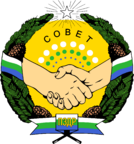
At the beginning of 2022, a monetary reform took place in the PZDR, during which the state monopoly was eliminated and all land plots included in the republic were given the right to print their own pyriaz. Moreover, each private currency issuer has the right to establish its own exchange rate and its own principles of support. The currency of the Poliano-Zarechie Dacha Republic is the dacha pyraz. This currency is pegged to the Russian ruble. As of July 3, 2022, the exchange rate of the pyraz is constant and is 10 rubles per one pyraz. Banknotes with denominations of 1, 3, 5, 10, 25, 50 and 100 pyrazes are in circulation.
-
The banknote of one hundred pyriazes
In addition to the pyraz, the dacha chervonets became an additional currency too on July 13, 2022. The first edition consisted of 25 coins with a face value of 1 chervonets of Poliano-Zarechie. Only coins with a face value of 1 chervonets are in circulation. You can exchange currency (including pyrazes) for chervonets at the national bank of Poliano-Zarechie. The purchase of chervonets by foreign citizens is allowed. The emission of the chervonets became possible thanks to the Supreme Leader of PZDR Ilya Musnitzki, who developed the design of the coins and financed the release of the first series of coins at his own expense. The appearance of the chervonets was warmly welcomed by the citizens and foreign friends of PZDR.
In July 2022, the first metal coins were issued in the PZDR. These are used for the Chervonets, which is issued by the state and serves as a guarantee of the monetary system. External experts estimate that the coin issuance project cost the PZDR authorities about 10,000 rubles (about $150)..
The main differences between the chervonets and the pyraz are: form of issue - aluminum minted coins; monopoly of the National Bank on the emission of chervonets; exchange rate of the chervonets to the pyraz - 1 chervonets for 10 pyrazes. Emission
The National Bank of the Republic lost its monopoly on the issuance of money in the course of the reforms of 2022, developed by the Ministry of Economy and National Wealth of PZDR headed by Diana Lendyashova with the support of the Supreme Leader Ilya Musnitzki. The issuer of the pyraz can be any plot or enterprise, or even an individual. The only condition is that the issuer must provide the pyrazes issued by him with his ruble reserves.
-
1 chervonets coin, reverse, 2022
-
A poster about the release of new coins
-
The five-chervonets banknote
-
The obverse of the five-chervonets banknote
The main economic partner of PZDR became the worker cooperative “Galats” from Dambovita. This cooperative performed many contracts for both state and private companies of Poliano-Zarechie in the field of graphic design and printing products. The distinctive feature of the work of “Galats” is the high professionalism and quality of its products, which made it a reliable partner for PZDR.
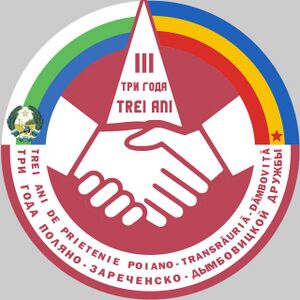
Cooperation with “Galats” also affected the sphere of development of banknotes of Poliano-Zarechie. Some series of banknotes were developed and printed in Dambovita, which emphasizes the level of trust achieved between the two micronations. This also ensures the uniqueness and originality of the design of the monetary units of PZDR.
It is worth highlighting the specialists from the Republic of Dambovita, who made a significant contribution to the formation of the heraldic symbols of Poliano-Zarechie. They created both the current and the previous coats of arms of the micronation. This important aspect allows to emphasize the unity and uniqueness of PZDR and demonstrates the level of professionalism and quality of their work.
Cooperation between Poliano-Zarechie and the Republic of Dambovita became an example of successful interaction between micronations, showing that even small states can create fruitful partnerships. This cooperation contributes to the strengthening of stability and development of both states, demonstrating the importance of mutual cooperation in the modern world of micronations.
Foreign policy
Wars
Cold war with exiled government of USSR

Since January 29, 2022, the PZDR has been in a state of declared war against the Soviet government-in-exile. This government is known for not recognizing the legality of the collapse of the USSR and the establishment of the Russian Federation. The declaration of war was preceded by the sending of a diplomatic note to the Soviet government demanding that claims be withdrawn on the territory of the PZDR. Republic explains the war by the defense of its territories. In fact, since the declaration of war, the troops of the belligerents have not met in open conflict. The PZDR troops during the war (summer 2022) were significantly improved and equipped with a full-fledged military uniform based on the uniform sets used in Russia in the 1990s. In accordance with the defensive concept of war, the PZDR troops do not cross the border of their micronation.
Attitude towards Russian intervention in Ukraine
PZDR consistently condemns the military actions of the Russian Federation against Ukraine. For the first time, a statement about this attitude was made in the "Pivnaya Pravda" (rus. Пивная правда") newspaper on February 27, 2022.
Attitude towards the Turkish invasion of Syrian Kurdistan
The Supreme Leader of the PZDR, Ilya Musnitzki, liked the publication of the Supreme Workers' Council of Dambovita, which expresses its principled condemnation of the Turkish invasion.
Attitude towards micronational wars
PZDR treats micronational wars in the post-Soviet space with disdain, because of their virtuality and frivolity of reasons. For example, on December 22, 2022, according to the "Pivnaya Pravda" newspaper, he made this statement:
"Guys, really, stop this shit with Aniota. All this "war" only shames Russian micronations even more. Trolling is one thing, but even that has already dragged on. Now it's just some kind of cringe".
This statement is dedicated to another conflict involving the Republic of Aniota, one of the micronations that previously concluded friendly treaties with the PZDR.
Musnitzki Doctrine

Poliano-Zarechie, known for its unique territorial structure and federal structure, stands out among the micronations of its kind. It is often attributed to closed states, not seeking to actively interact with other micronations. Within Poliano-Zarechie, however, such a statement is perceived as controversial.
In fact, Poliano-Zarechie is an active participant in the micronational community. Despite its uniqueness and specificity, PZDR was previously a member of the Commonwealth of Micronations and established diplomatic relations with a number of other micronations, having treaties of mutual recognition. This approach is motivated by the desire of Poliano-Zarechie to maintain an open dialogue with the world community and participate in micronational politics.
The main reason for the relative “closedness” of Poliano-Zarechie is related to the so-called “Doctrine of Musnitzki” - the main ideology of Musnitzki’s rule. In accordance with this doctrine, Poliano-Zarechie focuses its efforts on real activity, taking measures that bring practical fruits and benefits to the state in offline mode. This approach allows the micronation to focus on developing its internal potentials, strengthening its identity and autonomy.
Thus, Poliano-Zarechie sets itself atypical priorities for micronations, making an emphasis on its own development and identity, instead of actively striving to intervene in micronational conflicts and political alliances. However, this does not mean ignoring the micronational world, but rather indicates a desire to preserve its uniqueness and features.
Thus, Poliano-Zarechie represents a unique model of territorial structure and state interaction, where the federation of dacha plots coexists among micronations. The aspiration for real activity, preservation of autonomy and specificity of the doctrine of Musnitzki make PZDR unlike other micronations, which attracts the attention and interest of the surrounding world.
Political regime

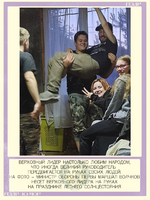
The Council of PZDR
The current realities in the PZDR led to serious changes in the system of power and political life. The Council of PZDR, which was previously the supreme legislative body, transferred a significant part of its powers to the Supreme Leader, which led to the strengthening of his power and status.
The Council of the Poliano-Zarechie Dacha Republic was previously the supreme legislative body of the country and consisted of representatives of trade unions of enterprises of the republic. It made important decisions on foreign and domestic policy, as well as appointed commissioners, who monitored the discipline of the army servicemen. Now, however, most of the powers of the Council are transferred directly to the Supreme Leader. At the time of the expansion of the powers of the Supreme Leader in 2022, the Council consisted of six people. However, in the course of the latest events, radical changes occurred in the political life of the Poliano-Zarechie Dacha Republic. The Council of PZDR transferred most of its powers to the Supreme Leader, which led to a significant redistribution of power in favor of one person. As a result, half of the members of the Council were subjected to repression and sentenced to execution, which testifies to serious restructuring in the structure of the state.
The Supreme Leader
Before the changes came into force, the Supreme Leader of the Poliano-Zarechie Dacha Republic had limited powers, which included the ability to appoint ministers and the head of the Cabinet of Ministers, conduct domestic policy in accordance with the decisions of the Council of PZDR and make decisions that were necessarily considered by the Council and could be canceled by the decision of voting in the Council.
However, after the changes, the Supreme Leader of PZDR received significantly more powers. He became obsessed with power and strengthened his position in the state, turning PZDR into a one-man dictatorship. Most of the powers that previously belonged to the Council of PZDR were transferred to the Supreme Leader.
Now the Supreme Leader makes all the key decisions related to foreign and domestic policy, without the need for coordination with the Council. He also appoints commissioners, who monitor the discipline of the army servicemen, and controls all the key people in the government. The decisions of the Supreme Leader became mandatory for execution, and the Council no longer has the right to cancel them by the decision of voting.
As a result of such changes, the Supreme Leader became the absolute ruler of PZDR, with unlimited power and control over all aspects of state administration. This led to the strengthening of dictatorial tendencies, suppression of opposition and violation of human rights, causing serious violations in the work of the state and political life in Poliano-Zarechie.
The Cabinet of Ministers
The creation of the Cabinet of Ministers, the executive body of state power, also underwent changes. Now the Cabinet of Ministers consists of ministers appointed by the Supreme Leader and the Prime Minister, who is the head of the Cabinet of Ministers. The Prime Minister replaces the Supreme Leader in some cases, and performs his assignments. However, important decisions and policies of the country are determined exclusively by the Supreme Leader, which emphasizes his unconditional power over the Cabinet of Ministers.
Thus, the Poliano-Zarechie Dacha Republic faced sharp changes in its political system, as a result of which a one-man dictatorship of the Supreme Leader Musnitzki was established. This led to radical changes in the structure of power and political life of the country, causing serious unrest and rejection by a certain part of society.

Autocracy of Musnitzki
The Supreme Leader Musnitzki has ruled the country since the proclamation of independence and has shown the greatest diligence aimed at the development of the country. Despite these merits, critics of Musnitzki accuse him of corruption schemes, establishing a cult of personality and a dictatorial regime in the country, which are only covered by the screen of beer democracy, and in fact all the resources of the regime are directed to the enrichment of Musnitzki and the top close to him. Critics of the authorities note that Musnitzki is depicted on banknotes, his portraits are drawn on posters, and his powers are much wider in reality than those documented. They also note that in propaganda articles Musnitzki is called “The Great Leader”, “The Wise Teacher” and “The Smartest Leader”, which, according to the opposition, indicates a cult of personality in Poliano-Zarechie. Musnitzki, one of the outstanding politicians of PZDR, established a one-man dictatorship with unlimited power. He became the Supreme Leader and the head of state, depriving all his opponents and competitors of political influence. This decision became a point of no return in the political life of the Poliano-Zarechie Dacha Republic, and now Musnitzki has absolute power over the country. The Cabinet of Ministers loses its significance, as the decisions are now made only by the Supreme Leader. The Prime Minister became a puppet, executing the instructions of the Supreme Leader, and has no real influence on domestic policy.
The situation in PZDR at the moment is a gloomy picture, where dictatorship and repression radically changed the political life of the region. Such changes led to the loss of guarantees and freedoms that the population previously enjoyed. Freedom of speech and opinion were suppressed, and the political opposition was crushed.
Art and culture in PZDR
rtists live in Poliano-Zarechie, sometimes capturing the beauty of the Republic in their works. For example, there is an artist Tamara Karslian, who painted the most famous picture in the Republic.
-
PZDR's Kosher certificate
-
Painting by Tamara Karslian
-
Rabbi Oleg Malčenko
There is a Jewish community in the PZDR. The head of the community is Rabbi Oleg Malčenko, who congratulates the Jews of the Republic on holidays and checks for kosher products produced in the Republic
Administrative structure
The territorial structure of Poliano-Zarechie is a unique form of micronational organization, based on the federation of dacha plots. PZDR is a unique example of a micronational system, where each dacha plot has its own identity and autonomy, forming its rights and obligations within the common state.
Throughout its history, Poliano-Zarechie adopted a unique form of organization, where dacha plots became the main elements of the social structure. Each of these plots is provided to citizens for recreation, agricultural activity or just relaxation in nature. Each dacha plot has its own traditions, rules and regulations, turning almost into a micronation within the borders of Poliano-Zarechie.
The central aspect of the territorial structure of PZDR is the equalization of the rights of all dacha plots based on the principles of federalism. Regardless of the size or geographical location, each plot has equal rights and obligations to the state. This approach ensures fairness and equality within Poliano-Zarechie and contributes to the unity of the micronation.
However, not every dacha plot located on the territory of Poliano-Zarechie is included in the state. The reason is the peculiarity of the formation of the territory. The borders of PZDR are not clearly defined on the map, as is customary in most states. The territory of Poliano-Zarechie is formed on the basis of the principle “where there are our citizens, there are our lands”. This implies flexibility in the distribution of territory depending on the presence of citizens on dacha plots, but this principle is limited by the boundaries of the Poliano-Zarechie SNT and the surrounding areas.
The territorial structure of Poliano-Zarechie is determined by historical, sociocultural and economic factors. The development of dacha plots and the emergence of micronations within the state reflects the desire of citizens for self-organization and a special type of cooperation. This unique experience attracts the attention of both researchers of micronational formations and curious tourists who want to get acquainted with the unusual form of state structure.
The territorial structure of Poliano-Zarechie as a federation of dacha plots is a unique phenomenon in the world of micronational states. Equalization of rights, autonomy of each plot and specificity of the formation of the territory would make PZDR a unique example of a democratic micronation, if all this imaginary federalism was not reduced to regional issues, when global decisions are made directly by the Supreme Leader.
Weekends and memorable dates
There are many memorable dates in the PZDR, six of which are days off. These are holidays such as:
January 1 - New Year.
March 8 is International Women's Day.
May 9 is the Victory Day over Nazism in World War II.
May 10 is Independence Day.
June 20–21 is the day of the Summer solstice.
December 21–22 is the day of the Winter solstice.
Also, there are seven days that are memorable dates, but are not free from work.
January 27 is Holocaust Memorial Day. The date was chosen according to the UN commemorative date
February 13 is Radio Day. The date was chosen according to the UN commemorative date
The first Sunday in May is Mother's Day. The date was chosen according to the UN commemorative date
June 6 is the Day of the Russian Language. The date was chosen according to the UN commemorative date
The third Sunday in June is Doctor's Day. The date was chosen according to the UN commemorative date
August 12 is the Day of Remembrance of the Victims of Communist Terror. The date was chosen as the day of the execution of the Jewish anti-Fascist committee
October 9 is Music Day. The date was chosen as the birthday of John Lennon




